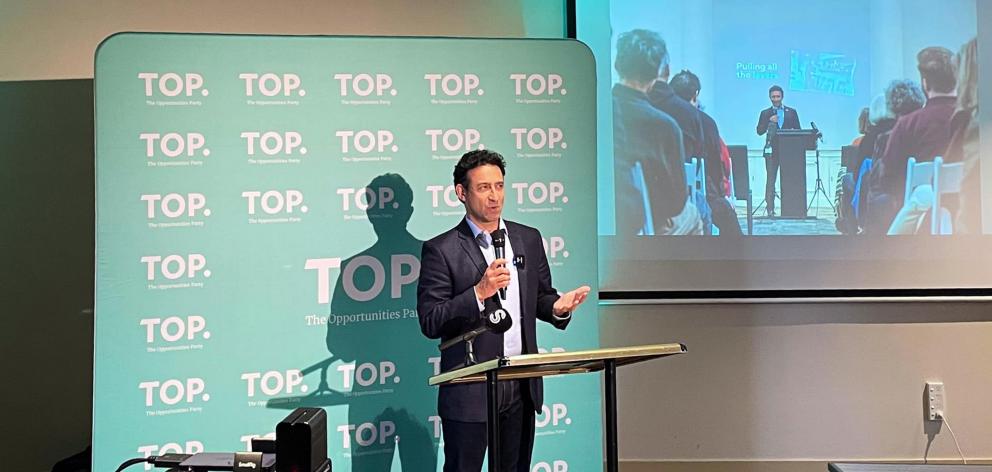

The devastation the weather system has wrought across the North Island has been truly appalling, and the right decision was made that with so many electorate MPs dealing with disaster at home and so many Cabinet ministers aiding the all-of-government response, that the House would not get the attention it deserved.
The sole dissenting voice, Act New Zealand’s David Seymour, was right to say Parliament should be able to scrutinise the disaster response, but waiting a week for the immediate panic to subside will not impede that process. It will likely even make the kind of probing questioning Act specialises in a more informed interrogation.
So, we have to look further afield for politics this week, but not too much further afield.
On Wednesday, with very few people paying attention due to Gabrielle — not to mention a strong earthquake which struck roughly about the same time he was speaking — Raf Manji launched his campaign to win the seat of Ilam in October’s general election.
Many will be asking, Who? Not the residents of the central Christchurch seat though, who are well aware Mr Manji is a two-term city councillor, helped found the Student Volunteer Army, an organisation now, as then, doing sterling work in disaster clean-up, and was an important figure in the aftermath of March 15.
Mr Manji is also, perhaps crucially, now the leader of a political party, The Opportunities Party (Top).
Nine years ago, when National’s Gerry Brownlee won by a near 12,000 majority, thoughts of Ilam being a seat of any interest whatsoever in a general election would have seemed preposterous.
But then, three years later, Mr Manji stood as an independent, securing a highly respectable second place, whittling Mr Brownlee’s majority to 8236. Add Labour’s 7662 votes, in finishing third, to his tally, and perhaps the fact Sarah Pallett won the seat for Labour in 2020 should not have been such a surprise.
Mr Manji sat out 2020, but he is back this year and is hanging the fortunes of Top on his success in Ilam.
It is not the worst strategy: it worked for Jeanette Fitzsimons in Coromandel and the foothold winning that electorate gave the Greens in Parliament was the key to its cresting 5% in every subsequent election. Winston Peters also did the same trick twice for New Zealand First, and Act’s existence is predicated on it.
Winning Ilam will be an incredibly tall order, but Mr Manji is not starting from ground zero and he now has a party apparatus behind him.

True, Top has yet to trouble the scorers when it comes to winning a seat in Parliament — although it did win a community board seat in Featherston at the recent local body elections.
But Mr Manji and co will have closely watched the last Australian election, where so-called "Teal" candidates did well in seats where voters were disillusioned by the main parties, and thought we’ll have a bit of that too.
Top’s mix of progressive liberalism, reformist economic policy and staunch environmentalism has an audience, and Dunedin is one of those places where Top plays well: the seat was its second highest source of party votes in 2020.
Should Mr Manji succeed in lifting Top’s profile, whoever stands for it in Dunedin will hope some of the limelight will reflect down on their campaign.
Probably not all coincidentally, Mr Manji was also in Dunedin last week and Top joined many other parties in having a stall at the Thieves Alley market. Top’s staunch opposition to any cuts to the new Dunedin Hospital shows it is attuned to local issues and hoping to make electoral progress as a result.
However, Top is far from the only minor party hoping to boost its performance in our part of the world.
As Act showed with its stellar performance in the southern seats in 2020, voters south of the Waitaki are not wedded to ticking just Labour, National or Green.
New Zealand First, which had a list MP based in the south when last in the House, is the most obvious of the host of minor parties thirsting for 5%.
The Māori Party, too, should harbour ambitions for an improved performance in Te Tai Tonga: its 2020 candidate Tākuta Ferris came second with 7422 votes but only secured 2596 party votes. A better party vote showing in the South could be crucial in its securing an additional list MP.
Big meeting
A solid showing in the South by Labour at this year’s Waitangi Day event at Ōtākou Marae: all its local electorate and list MP, as well as five ministers, trekked out to the peninsula.
Although some were soon called away by events elsewhere, others stuck around Dunedin for a day, allowing local businesses and sector groups the chance to bend their ear about their issues.
Southland National MP, and Treaty settlements spokesman, Joseph Mooney was among the politicians present from the other side of the aisle.











